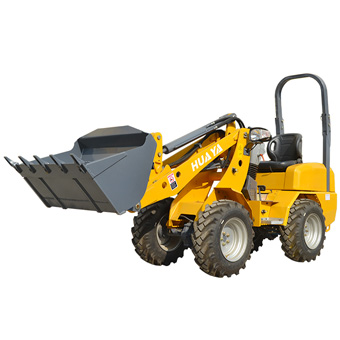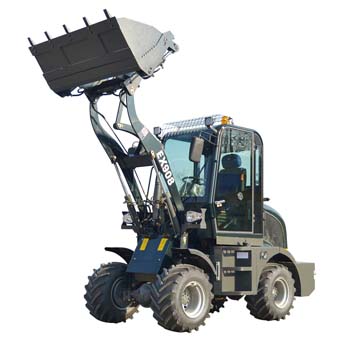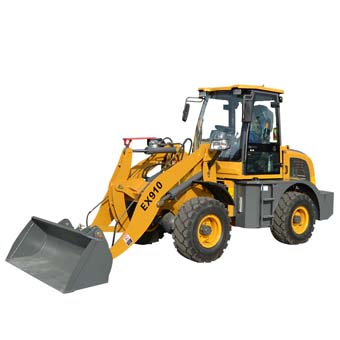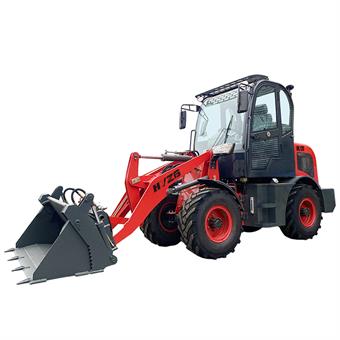
Actualités
Lorsque vous êtes sur le point d'investir dans la plus petite des chargeuses sur pneus, le fournisseur que vous choisissez peut faire de votre expérience un succès ou un échec. En effet, l'achat de la machine n'est qu'un début - le véritable enjeu réside dans l'assistance, le service et la fiabilité du fournisseur. Examinons les questions essentielles que vous devez poser avant de signer ce contrat.
Une petite chargeuse sur pneus est une machine compacte mais puissante utilisée pour déplacer des matériaux tels que de la terre, du gravier, du sable ou des débris de construction. Elles sont conçues pour les espaces restreints où les machines plus grandes ne peuvent pas manœuvrer.
Qu'il s'agisse d'agriculture, d'aménagement paysager ou de construction, les petites chargeuses sur pneus sont appréciées pour leur polyvalence, leur rentabilité et leur facilité de transport. Elles comblent le fossé entre le travail manuel et les chargeurs lourds.
Un fournisseur de qualité vous garantit non seulement une machine, mais aussi l'assistance, l'entretien et les conseils nécessaires pour que votre chargeuse fonctionne au mieux.
Un fournisseur fiable est plutôt un partenaire. Il fournit des pièces de rechange, des formations et des services longtemps après l'achat, ce qui rend l'expérience de la propriété plus harmonieuse.
Vous devriez toujours vous renseigner sur les différentes marques et les comparer. Par exemple, Huaya et Caterpillar proposent tous deux des chargeuses compactes, mais leurs caractéristiques et leurs prix varient.
Les machines doivent être conformes aux certifications ISO ou CE en matière de sécurité et de durabilité. Demandez toujours des documents avant de vous engager.
Une entreprise présente sur le marché depuis plus de 10 ans est généralement plus digne de confiance. Ses antécédents en disent long.
Demandez des témoignages ou des références. Si d'autres clients sont satisfaits, c'est bon signe.
Ne vous contentez pas de prix vagues. Un bon fournisseur doit indiquer clairement le coût de la machine, les frais d'expédition, les taxes et les options supplémentaires.
Certains fournisseurs vous attirent avec des coûts initiaux peu élevés, mais vous imposent des frais supplémentaires par la suite. Clarifiez ce point dès le départ.
S'agit-il d'une garantie d'un an ? 2 ans ? Couvre-t-elle uniquement les pièces ou également la main-d'œuvre ? Ces détails sont importants.
Un bon fournisseur doit disposer d'une équipe d'intervention rapide en cas de panne, faute de quoi votre machine risque de rester inutilisée pendant des semaines.
Sans stock local, vous risquez d'être confronté à des retards de plusieurs semaines, voire de plusieurs mois. Demandez toujours.
Les fournisseurs disposant d'une logistique efficace ou d'entrepôts locaux sont les grands gagnants.
Vous avez besoin d'un godet à neige, de fourches à palettes ou de pneus spéciaux ? Certains fournisseurs peuvent adapter les chargeurs à vos besoins.
Les accessoires augmentent la polyvalence. Renseignez-vous sur les produits disponibles et compatibles.
Certains fournisseurs livrent en 30 jours, d'autres en plus de 90 jours. Obtenez toujours un engagement clair.
Proposent-ils un service d'expédition accélérée ? Quelle est la compensation accordée en cas de retard de livraison ?
Un fournisseur qui forme votre équipe garantit un fonctionnement sûr et efficace de la machine.
Des manuels, des vidéos et des guides clairs sont essentiels pour faciliter l'utilisation et l'entretien.
Selon votre pays, les machines peuvent devoir être conformes aux normes EPA Tier 4 ou Euro Stage V.
Les modèles écologiques permettent d'économiser du carburant et de réduire les émissions, ce qui peut s'avérer essentiel pour le respect de la réglementation.
Toutes les entreprises ne peuvent pas se permettre de payer d'emblée l'intégralité de la somme due. Renseignez-vous sur les plans de paiement.
Vérifiez s'ils acceptent PayPal, TT ou les virements bancaires.
La représentation locale facilite le service après-vente.
Les fournisseurs tels que Volvo CE et XCMG disposent de réseaux solides, ce qui signifie que les pièces et le service sont largement disponibles.
Cela permet de maintenir des prix compétitifs et de garantir que vous obtenez la meilleure offre.
Tenez compte des délais de livraison, de la garantie et de la réputation, et pas seulement du prix.
Une mauvaise communication, l'absence de garantie claire ou des prix vagues sont autant de signaux d'alarme.
Utiliser des services d'assurance commerciale (comme celui d'Alibaba) ou des audits vérifiés par des tiers.
Pouvez-vous confirmer les conditions de garantie par écrit ?
Quel est le prix final "tout compris", y compris les frais de port et les taxes ?
Disponibilité des pièces détachées
Calendrier de livraison
Assistance après-vente
Choisir le bon fournisseur pour la plus petite chargeuse sur pneus ne consiste pas seulement à obtenir le prix le plus bas. Il s'agit d'établir un partenariat fiable qui assure le bon déroulement de vos opérations. En posant les bonnes questions, vous éviterez les mauvaises surprises et ferez en sorte que votre investissement soit rentable pendant de nombreuses années.
Vous pouvez faire les deux, mais un concessionnaire local offre souvent un service plus rapide et une assistance pour les pièces détachées.
Très important. Une marque connue est généralement synonyme de fiabilité et de valeur de revente accrues.
Les chargeurs d'occasion peuvent être moins chers, mais il faut toujours vérifier l'historique de l'entretien et l'état de l'appareil.
Généralement de 7 à 10 ans avec un entretien adéquat, mais les meilleures marques peuvent durer plus longtemps.
Oui, mais ils conviennent mieux aux tâches légères et moyennes. Pour les travaux très lourds, il est recommandé d'utiliser un chargeur plus grand.
Précédent : Une mini-pelle peut-elle creuser un sol gelé ?



